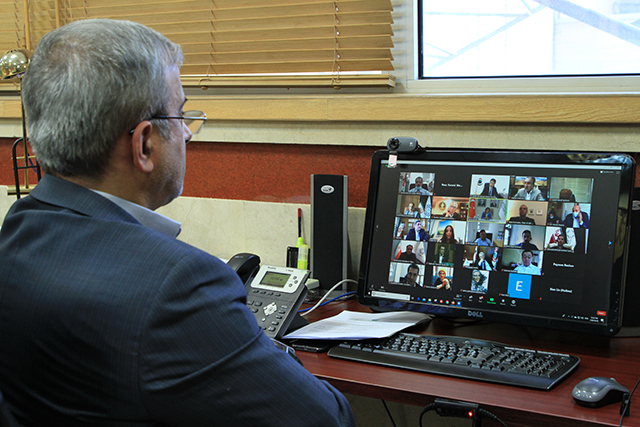|
The head of Tehran disaster Mitigation and Management Organization (TDMMO) stating that the nature of modern crises is beyond geographical borders, said: "We need cooperation between countries to control the corona virus and deal with it effectively."
According to the Public Relations of TDMMO, Dr. Reza Karami Mohammadi said at the meeting on urban health and economy in the post-Corona period, which was held online on the sidelines of the seventh meeting of the Executive Board of the Asian Mayors Forum: I hope that these meetings will help us on the path to achieving resilient societies and provide the necessary ground for more communication and better interaction in this field. Despite these turbulent times, there is potentially a positive outcome for the future of development assistance. The unprecedented systemic challenges posed by the coronavirus crisis, and the responses we have already seen, will fast-track the transformation of an old paradigm of donor–recipient aid relations towards a model of international cooperation between all countries.
The head of Resilience Committee of Asian Mayors Forum continued: A similar situation in different societies has shown that due to the development of communication in various aspects of human life, the nature of modern disasters goes beyond geographical borders, and therefore we need cooperation between countries to control the coronavirus and deal with it effectively.
International cooperation amplifies individual countries’ efforts in the fight against the COVID-19 pandemic. This cooperation is not only useful, but indispensable. In the short run, cooperation between governments is needed to curb the pandemic and expedite exit from the crisis. In the medium and long run, coordinated policies can facilitate recovery and the rebuilding of socioeconomic systems in inclusive and sustainable ways and help prepare for future risks and pandemics.
The head of Resilience Committee of Asian Mayors Forum added: Mechanisms for knowledge sharing about protocols of screening and treatment could help, especially in countries with stretched health systems. Countries that had a head start in dealing with the pandemic could offer important lessons and share best practices; but fiscal support will also be needed.
The head of TDMMO said: COVID-19 is an existential threat that has upended global systems. Without effective co-operation, both the exit from the crisis and the recovery is likely to be slow and weak.
First, this is true for the health sector, as effective disease surveillance, swift vaccine development and deployment, and preparedness for future epidemics benefit from multilateral action.
Second, preserving trade openness and increasing the robustness and resilience of supply chains can not only ensure countries’ access to vital medical goods, but also invigorate the post-pandemic economy.
Finally, internationally coordinated fiscal and monetary policies, can help the global economy weather the current shock, while preparing it for a sustainable and inclusive recovery.
Karami Mohammadi stating that the Resilience and Disaster Management Committee of the Asian Mayors' Forum would pave the way for achieving this valuable goal, especially in the Asian region added: Planning for the following steps is essential to tackling similar global crises and making cities resilient including developing intelligent data platform to better monitor and respond to changing conditions especially in neighborhood scales; having collective and integrated partnership between the private and the public sector; paying serious attention to local governments to succeed in the disaster management cycle; attracting public participation, NGOs, and universities to fill the existing gaps; defining build back better approach and preparing inclusive rehabilitation plans.
The seventh meeting of the Executive Board of the Asian Mayors Forum (AMF-EB7) was held online and chaired by Dr. Pirooz Hanachi, Mayor of Tehran.
According to this report, in the first part of the meeting, mayors and city managers, experts and representatives of international organizations discussed about the topic of "Urban Economy and Health in the Post-Corona period" with the aim of exchanging experiences and approaches to managing and controlling the social and economic dimensions of the crisis at the city level. Also, the principles and appropriate solutions for simultaneous management and creating a balance between the two key challenges of this crisis, namely "citizens' health" and "businesses and urban economy" were discussed.
The Forum of Asian Mayors is an international non-governmental, non-profit network established in Tehran in 2008 with the participation of a large number of mayors, city managers, members of associations and city councils, and experts in the field of urban planning and management and its permanent headquarters are located in this city.
So far, more than one hundred cities from all over the vast continent of Asia have participated in the international meetings and conferences of this organization in Tehran, Istanbul, Bangkok, Manama, Haiku (China), Qazvin and Gazi Antep (Turkey) and more than 60 Asian cities have official membership in this Forum.
From 2018 to 2021, the rotating chairman of this organization is Ms. Fatemeh Shahban, the mayor of the metropolitan city of Ghazi Antep, Turkey, who is also the chairman of the Turkish Municipalities Association.
The Executive Board of the Asian Mayors' Forum consists of the mayors of 21 cities, who are elected every three years and are responsible for leading and advancing the decisions of the General Assembly and the programs of the organization.
Currently, the head of the Tehran Disaster Mitigation and Management Organization is in charge of managing the resilience committee of the Asian Mayors Forum.

|